The formal report is one of the biggest assignments for ENGL301. It was the main focus of unit 3 and parts of unit 4. Based on the feedback received from my team member, Leif Jack, I have written the final draft of my formal report. In this report, I have included more and edited information on the figures used, fixed my pagination (with an addition of a figure list), and discussed my analysis to its full extent.
A Proposal for Recommending Dairy-Free Options at Ice Cream on Grand, New Jersey, USA
For Syed Rizvi
Owner of Ice Cream on Grand (Englewood, New Jersey)
By Piper Kim
UBC Undergraduate Student, ENGL 301 Student
University of British Columbia
August 2, 2022
Introduction
History of Ice Cream on Grand
Ice Cream on Grand is a local Kosher ice cream shop located in Englewood, New Jersey. Over the past two decades, they have served high quality home-made ice cream to our community and to people all over the country. They serve a variety of flavors ranging from plain vanilla to fruity flavors to Cookie Monster (the most popular flavor). They have 32 flavors in total including three sugar-free and two sherbets (still contains skim milk), and three soft-serve options (vanilla, chocolate, and swirl). Their menu has many options, offering the ice cream in cups, cones, sundaes, milkshakes, and freezer packs making it a perfect dessert spot for individuals, friends, and families.
All types of customers come in to try Ice Cream on Grand. Attracting over 2000 customers weekly, many people come to try one of the 32 flavors offered. However, all the ice cream contains dairy, becoming a limiting factor for those who cannot consume dairy. As a result, there is a loss of customers.
Purpose of this Report
Although the ice cream shop carries a variety of flavors (32), they have no options for those who are vegan or lactose intolerant. They have had the same flavors for over 20 years, and now it is time to change.
The purpose of this formal report is to offer recommendations for offering dairy-free options at Ice Cream on Grand. This local ice cream shop has been in business for more than two decades yet carries the same 32 flavors, all containing dairy. In order to be more inclusive to a variety of (new) customers who are vegan, lactose intolerant, etc. Ice Cream on Grand needs to seek dairy alternatives. By finding a common ground, there will be a positive impact on the business (i.e. revenue) and customer traction/satisfaction.
Methods of Data Collection
My research process included a consultation with the company Panza, which is the head supplier of our productions to look for possible non-dairy options. Surveys were conducted online to gain a better insight into whether this addition of non-dairy flavors is a positive idea. In the survey, people were asked about how frequently they eat ice cream on a weekly basis and if they believe lactose intolerance is common. In addition, people were asked which dairy alternative is the most popular and if they appealed to the idea of dairy-free ice cream. These questions were designed to better understand people’s wants for ice cream. With this survey, I analyzed the results to offer recommendations. Furthermore, I investigated surrounding competition to see whether they carried any non-dairy flavors. My secondary source includes the government consensus so I can see the demographics of Englewood, NJ, Leonia, NJ, and Tenafly, NJ (Leonia and Tenafly are neighboring towns of Englewood). Lastly, after consulting Panza, I was able to gain a rough estimate of the cost of dairy alternatives to better assess the feasibility of this report.
Scope
To determine the feasibility of the recommending a non-dairy ice cream flavor, I will pursue these five areas of inquiry:
- What non-dairy suppliers are Kosher (Ice Cream on Grand only can serve Kosher products), and what are the approximate costs of production?
- What is the current demand for dairy-free ice cream?
- Do other ice cream competitors carry non-dairy flavors?
- What price for non-dairy ice cream can the market bear?
- The demographics of the area(s)
Data Section
Data on the % of Lactose Intolerant People
According to the National Institutes of Health, lactose intolerance is “an impaired ability to digest lactose, a sugar found in milk and other dairy products.” This is a health issue that cannot be fixed but can be possibly avoided with the use of non-dairy products. About 65% of the adult human population has this sort of lactose intolerance, which results in abdominal pain and other gastrointestinal consequences after eating dairy products (Glaser). Based on figure 1, the United States of America (where Englewood, NJ is located) is listed with about 15-30% prevalence of lactose intolerance in the population. In addition, lactose intolerance in adulthood that shows up most often in people of East Asian heritage, affecting 70 to 100% of the population, and is also very common in people of West African, Arab, Jewish, Greek, and Italian descent. Lactose intolerant and vegan (a strict vegetarian who consumes no food that comes from animals such as eggs and dairy) customers are more common than we expected. In order to cater to their needs, dairy alternatives are crucial in bringing inclusivity to all groups of customers.
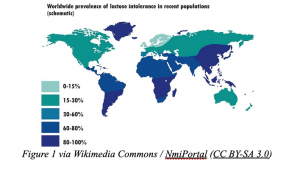
Demographics
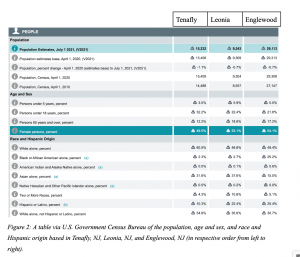
This data shows the demographics of Englewood, NJ and its neighboring towns, Tenafly and Leonia. As the table shows, Englewood has a 15% Asian population while Tenafly has 31.8% and Leonia with 37.6%. Based on our previous findings on lactose intolerance, this impaired ability is most prevalent in people of East Asian descent, with 70 to 100 percent of people affected in these communities. With almost one third of the population being Asian alone in the neighboring towns, there is quite a big number of people who can potentially be lactose intolerant and not be able to eat ice cream at Ice Cream on Grand. As a result of our limitations, Ice Cream on Grand will consequently lose this many potential customers due not offering dairy alternatives.
Religion
Englewood is a city located in Bergen County, New Jersey, United States. The Jewish population of Bergen County, where Englewood is located, was over 91,000 (2009) (“Kosher and Jewish Life in Englewood”). Ice Cream on Grand is a Kosher certified facility meaning that its food does not have any non-kosher ingredients in accordance with Jewish law. Kosher foods include meat and milk products not being mixed, animal products from non-kosher animals (like pork, shellfish, and others) are not included, and any meat from kosher animals is slaughtered in the correct procedure. There are several other requirements that need to be met, both in the process of food preparation and who performs the process. However, despite these practices, lactose intolerance is also very common in people of Jewish descent (“MedlinePlus”). As a business, Ice Cream on Grand needs to adhere to these guidelines and caters to many Jewish families and individuals. Thus, understanding that lactose intolerance runs in the Jewish descent, the large Jewish population in Bergen County needs to be considered in the customer turnout rate (about 20% of Ice Cream on Grand customers are Jewish). As a result, dairy-free options are a must in keeping this group of customers.
Summary of Online Surveys
Online surveys were conducted anonymously. In order to garner attention, I posted the link to my survey on my social media platform (Instagram) to reach the targeted audience. During the seven days of data collection, there were a total of 29 responses. Below are the nine questions used (in order) and the results. Link to the survey: https://ubc.ca1.qualtrics.com/jfe/form/SV_eszT7i4cv2nDnxk

Out of the 29 responses, twenty of the respondents answered that they eat ice cream 1-2 times on a weekly basis while four people answered 3-5 times weekly. Two people chose 5+ times a week and three respondents chose ‘does not apply’.

This question helped determine the popularity of dairy-free options, ten of the respondents believe that dairy-free options are popular while seven believe that they are not. However, the most answered choice was ‘unsure’ with twelve picks.
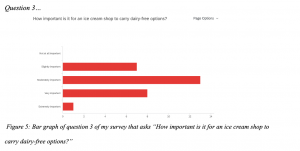
This question asked how important it is for an ice cream shop to serve dairy-free options. Seven of the respondents chose ‘slightly important’. Eight of the people chose ‘very important’ and thirteen chose ‘moderately important’. One person answered, ‘extremely important’ while no one selected ‘not at all important’. 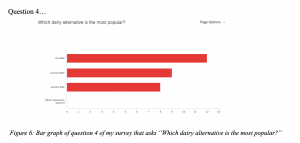
For dairy alternatives, the most popular option selected was ‘oat milk’ with twelve votes while ‘coconut milk’ followed with nine votes. Eight of the respondents selected ‘almond milk’.
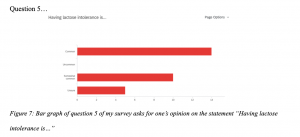
Fourteen of the respondents believe that lactose intolerance is ‘common’ while ten selected ‘somewhat common’. Five people were ‘unsure’ of the commonality. However, none selected ‘uncommon’. 
Thirteen people selected that dairy-free ice cream flavors should ‘definitely not’ cost more than regular ice cream. Ten people believe that it should ‘probably not’ cost more, while four selected that it should ‘probably yes’ cost more than regular ice cream. Two people selected ‘unsure’

Majority of the votes agreed with the following statement, “having dairy-free flavors at an ice cream shop allows for more inclusivity” with 27 votes while two people selected ‘unsure’.

This question asked about the likelihood of consuming dairy-free ice cream (on a scale of 1-100, 1 being least likely and 100 being the most likely). The mean or average of this question was 56.31.
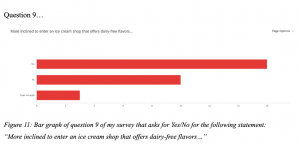
Sixteen of the respondents answered ‘yes’ to being more inclined to enter an ice cream shop that offers dairy-free flavors. Ten people answered ‘no’ while three chose ‘does not apply’.
Analysis of Online Survey Findings
Question 1 (respective to figure 3):
A majority selected that they eat ice cream AT LEAST once a week. By understanding how many times an individual eats ice cream in a week, helps us put into perspective how frequent a customer will come to Ice Cream on Grand.
Question 2 (respective to figure 4):
The answers were similarly divided. Although most people were unsure of diary-free options being popular, all the participants were aware of dairy-free options.
Question 3 (respective to figure 5):
All of the respondents believe that there is some level of importance for an ice cream shop to carry dairy-free flavors.
Question 4 (respective to figure 6):
All dairy alternatives are somewhat at the same level of popularity as each other. Although oat milk was the most selected, coconut and almond milk trailed behind by a couple of votes.
Question 5 (respective to figure 7):
Majority of the respondents believe that lactose intolerance is common.
Question 6 (respective to figure 8):
Majority of the respondents believe that dairy-free options should NOT cost more than regular ice cream.
Question 7 (respective to figure 9):
All the respondents believe that having dairy-free options allows for more inclusivity.
Question 8 (respective to figure 10):
More than half the people (56.31% of people) would consume dairy-free flavors
Question 9 (respective to figure 11):
Majority of the respondents would be more inclined to enter a shop with dairy-free options.
Based on these questions, most of the responses were positive (leaning towards dairy alternatives). Majority of the respondents are more inclined to try dairy-free options and believe that it should be the same cost as regular ice cream. The demand for dairy alternatives is higher than expected and
Kosher Suppliers of Dairy-Free Alternatives
Ice Cream on Grand uses the supplier, Panza and Sons, Ltd. This supplier provides Kosher products and dairy-alternatives. Concerning Ice Cream on Grand’s competitor, Bianco Nero Gelato, they do carry a variety of dairy-free flavors including sorbets and vegan flavors. Bianco Nero Gelato also uses the supplier, Panza and Sons, Ltd.
Estimated Cost of Dairy-Alternatives
| Item | Quantity | Total Estimated Cost |
| Coconut Milk | One Case = 4 gallons | =~ $60 USD |
| Almond Milk | One Case = 4 gallons | =~ $40 USD |
| Oat Milk | One Case = 4 gallons | =~ $65 USD |
Figure 12: A table showing the estimated cost of dairy alternatives.
After consulting with the Panza (the supplier), he gave an estimate on the following dairy alternatives: coconut milk, almond milk, and oat milk. The most expensive alternative was oat milk with one case (4 gallons) being about $65 and the cheapest alternative being almond milk, costing about $40. Coconut milk costs about $60. In comparison to regular ice cream mix which cost about $35 (4 gallons), dairy alternatives are more expensive. One case of these alternatives make four ice cream tubs which last about one week.
Feasibility Assessment
Ice Cream on Grand attracts about 250 customers on weekends and about 500 customers on weekends. If the weather is good, Ice Cream on Grand can make approximately $42,000 USD a week (averages out to be $6,000/day). Ice Cream on Grand makes enough to test-run dairy alternatives. It is feasible for Ice Cream on Grand to buy one case and attempt to attract customers they never had before.
Conclusion
Summary and Interpretation of My Findings
Ice Cream on Grand is a staple dessert spot in New Jersey, serving customers for over 20 years. Although they carry 32 flavors, they do not cater to those who are vegan or lactose intolerant, failing to satisfy specific customer groups. If Ice Cream on Grand accepts this proposal, they will begin to see new types of customers and expect an increase in business. Based on my findings, more people are interested in dairy-free ice cream and would be more inclined to eat here. In addition, having dairy-free options allow for more inclusivity and that is what we strive to be. Lastly, I believe that this proposal is feasible and will work in gathering more attention and customers.
Recommendations
After reviewing the research, I conducted, I have concluded the following recommendations to Syed Rizvi:
- It is recommended that Ice Cream on Grand has at least one non-dairy flavor in their collection as it will cater to more customers, satisfy their needs, and bring more inclusivity. Thus, increasing interests and revenue. In addition, their competitor carries at least one non-dairy flavor and Ice Cream on Grand does not want to fall behind.
- It is recommended that dairy-free options should cost the same as regular ice cream.
- It is recommended that it should be one of the following dairy alternatives: coconut, oat, or almond milk.
Works Cited
Englewood Jewish & Kosher Guide 2022: Kosher Info in Englewood, New Jersey, www.totallyjewishtravel.com/Kosher_Tours-TL3774-englewood_new_jersey-Vacations.htm.
Glaser, Kelli. “Lactose Intolerance: Pathology,” britannica.com
(Figure 2) U.S. Census Bureau Quickfacts: United States. www.census.gov/quickfacts/fact/table/US/PST045221.
“What Is Kosher?” What Is Kosher? | Kosher.com, www.kosher.com/whatiskosher.
For better viewing purposes and easy download, a pdf version is available below: